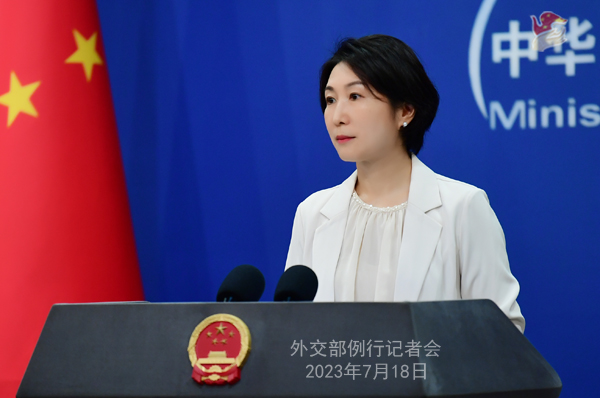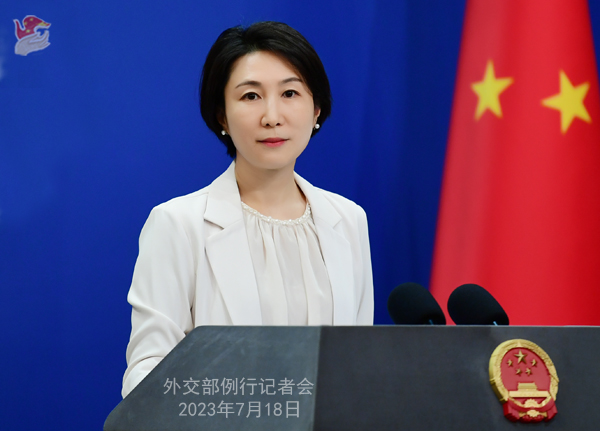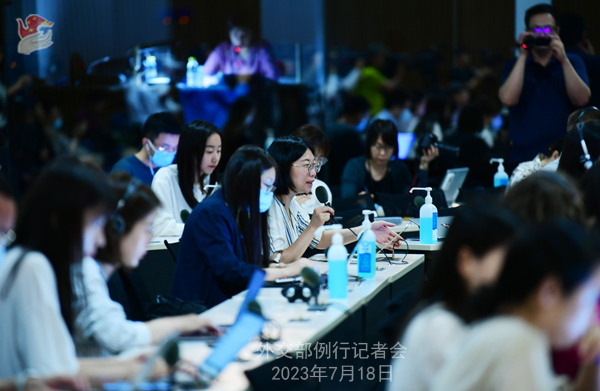| Foreign Ministry Spokesperson Mao Ning’s Regular Press Conference on July 18, 2023 |
| 2023-07-18 18:29 |
|
People’s Daily: It is reported that the resolution on “the contribution of development to the enjoyment of all human rights” submitted by China was adopted again at the 53rd session of the UN Human Rights Council. Could you share more information with us? Mao Ning: The 53rd session of the UN Human Rights Council (UNHRC) recently adopted again the resolution on “the contribution of development to the enjoyment of all human rights” submitted by China and co-sponsored by 62 countries. The resolution reaffirms development’s contribution to the enjoyment of all human rights by all and calls for efforts to find new approaches to new challenges in attaining the “2030 Agenda for Sustainable Development” during post-COVID recovery and to promote and protect human rights through high-quality development by strengthening global sustainable development partnership and global cooperation. In their statements, representatives of Pakistan, the UAE, Sudan, Honduras, and some other countries commended China for submitting the draft of this important resolution and expressed appreciation for China’s leadership. They said that the adoption of the resolution fully showed the aspiration and voice widely shared by developing countries. Development is an eternal theme for humanity. Only with better development can human rights be better advanced and protected. The draft resolution from China and the co-sponsors is aimed at encouraging the world to adopt a people-centered approach in efforts to address inequalities in the interests of high-quality, inclusive, and equitable development. This is the fourth resolution with the same title that has been submitted by China and adopted by the UNHRC, and yet another contribution China has made to global sustainable development and human rights governance. The adoption of the resolution reflects the broad support for promoting human rights through development—an approach advocated by China—and will help give developing countries more voice and say in global human rights affairs. China Daily: Since armed conflict broke out in Sudan on April 15 this year, the humanitarian situation in the country has been deteriorating. What humanitarian assistance has China provided to Sudan? Mao Ning: Sudan is having a difficult time. The country is in dire need of international support and assistance. As Sudan’s good friend and partner, the Chinese government will aid Sudan with emergency humanitarian supplies worth RMB 10 million to alleviate the humanitarian distress. Among those supplies, medical materials have already been on their way since July 15, and over 900 tonnes of grains are expected to be shipped in mid-August. In addition, the Red Cross Society of China has provided daily necessities to the Red Crescent Society of Sudan, which have arrived on July 14. China will continue to provide Sudan humanitarian support in light of its need to help ease the humanitarian situation.
Dragon TV: It was reported that torrential rain has recently hit the ROK, triggering secondary disasters, including dam failures, landslides and mudslides. 41 people have died and nine are missing. What is your comment? Mao Ning: We noted the reports about the deadly torrential rain in some parts of the ROK. China extends deep condolences over the loss of lives and sincere sympathies to the victims’ families and the people in the affected areas. China hopes they will get through this difficult time and rebuild their home soon. TASS: The Black Sea grain deal, which had been extended for several times by Russia, ceased to be valid yesterday. Moscow refused to extend the deal this time because the part of the deal concerning Russia, which involves the removal of restrictions on its agricultural export, has not been fulfilled. Moscow said that although the deal allows the Ukrainian grain to be shipped to the world’s poorest countries, most of the shipment has gone to western developed countries. What’s your comment on the termination of the Black Sea grain deal? Will this affect China’s food security? Mao Ning: We hope that parties concerned will properly resolve the international food security issue through dialogue and consultation. China stands ready to step up communication and cooperation with other parties to facilitate more international common understandings and contribute to world food security.
Sky News: Sky News just released a series of exclusive reports from within Myanmar where the team there witnessed some of the horrors of the terrible civil war that’s playing out. The Myanmar military junta seized power and there’s overwhelming evidence that it’s acting violence against its citizens, including directly targeting and killing civilians. Despite this, China is investing in its trade links with Myanmar and there have been meetings between top officials, including Qin Gang. And according to the UN, China sold Myanmar arms. The accusation is that China is bankrolling the military junta despite its terrible crimes. What do you say to that accusation? And how does China justify its support for this regime? Mao Ning: I did not read the reports you mentioned. Nor do I know whether their source is accurate. As to the issue of Myanmar, China’s position is consistent and clear-cut. As a friendly neighbor, China believes that all parties and factions in Myanmar need to proceed from the long-term interests of the nation and people, find a proper way to resolve the problems through political dialogue under the constitutional and legal framework and restore nationwide social stability at an early date. We believe that any action taken by the international community needs to contribute to Myanmar’s political and social stability, promote its peace and reconciliation, and avoid escalating the conflict. This is what China’s approach has been. If the report that you referred to is the one issued by the UN Special Rapporteur on Myanmar, I’d like to point out that the Special Rapporteur actually overstepped his mandate. The report contained smears against normal arms trade between sovereign countries and misrepresentation of facts. China firmly opposes it. We have asked the Special Rapporteur to stay objective and fair and strictly follow his mandate and stop serving any political agenda so as not to hurt the credibility of the Special Procedures. Bloomberg: The Biden administration’s plan to restrict investments in China will be focused on cutting-edge technology and only new investments and likely won’t go into effect until next year, according to people familiar with the matter. The officials are aiming to wrap up a proposal by the end of August, which could possibly prohibit investment in China’s semiconductor, quantum computing and artificial intelligence sectors. Other sectors, such as biotechnology and energy sectors, are not expected to be part of the restrictions. Does the foreign ministry have any comments on these investment restrictions? Mao Ning: China opposes US politicizing and weaponizing of trade and tech issues. It is in no one’s interest to place arbitrary curbs on normal technology cooperation and trade, violate the market economy principles and destabilize global industrial and supply chains. We hope that the US will follow through on President Biden’s commitment of not seeking to “decouple” from China, halt China’s economic development or contain China and create a sound environment for China-US economic cooperation and trade. TASS: The information center of the National Antiterrorism Committee of Russia noted that overnight on Monday two Ukrainian surface drones carried out a terrorist attack on the Crimean Bridge, which killed two adults and injured one child. Russian President Putin stressed that this attack made no sense, since for a long time, the Crimean Bridge is not used for military transportation. What is your comment? Mao Ning: China’s position on the Ukraine crisis is consistent and clear. We hope all parties will be committed to a political settlement of the crisis and jointly help deescalate the situation. China believes that relevant parties need to avoid attacking civilian facilities and objects, protect the safety of civilians and observe international humanitarian law.
|
 | ||||||||||||
 | ||||||||||||
|



